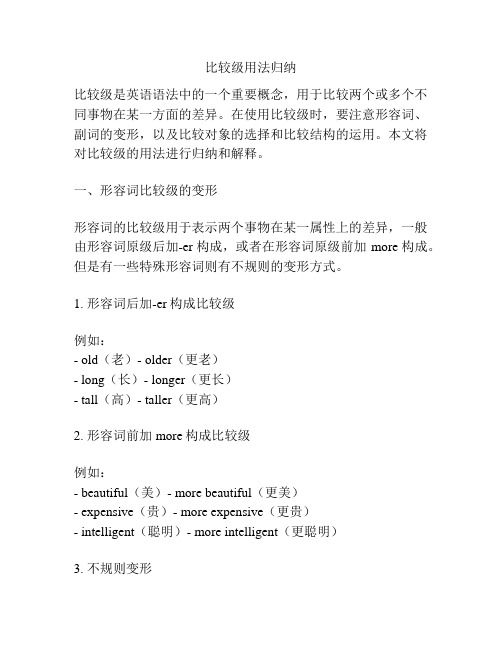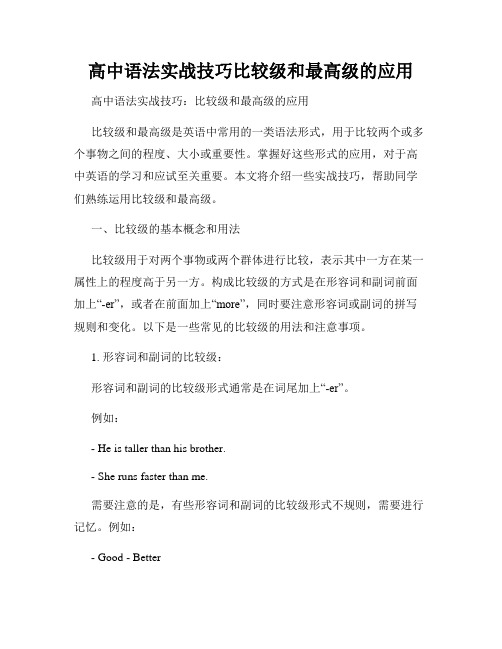比较级的特殊用法
比较级用法归纳

比较级用法归纳比较级是英语语法中的一个重要概念,用于比较两个或多个不同事物在某一方面的差异。
在使用比较级时,要注意形容词、副词的变形,以及比较对象的选择和比较结构的运用。
本文将对比较级的用法进行归纳和解释。
一、形容词比较级的变形形容词的比较级用于表示两个事物在某一属性上的差异,一般由形容词原级后加-er构成,或者在形容词原级前加more构成。
但是有一些特殊形容词则有不规则的变形方式。
1. 形容词后加-er构成比较级例如:- old(老)- older(更老)- long(长)- longer(更长)- tall(高)- taller(更高)2. 形容词前加more构成比较级例如:- beautiful(美)- more beautiful(更美)- expensive(贵)- more expensive(更贵)- intelligent(聪明)- more intelligent(更聪明)3. 不规则变形有一些形容词有一些不规则的变形方式,需要特别记忆,例如:- good(好)- better(更好)- bad(坏)- worse(更坏)- little(小)- less(更少)- many/much(多)- more(更多)二、副词比较级的变形副词的比较级变形方式和形容词类似,一般在副词后加-er,或者在副词前加more。
同样,也有一些特殊的副词比较级变形方式。
1. 副词后加-er构成比较级例如:- fast(快)- faster(更快)- soon(快)- sooner(更快)- late(晚)- later(更晚)2. 副词前加more构成比较级例如:- carefully(小心地)- more carefully(更小心地)- slowly(慢慢地)- more slowly(更慢慢地)- quietly(安静地)- more quietly(更安静地)3. 不规则变形有一些副词的比较级变形方式也是不规则的,例如:- well(好)- better(更好)- badly(糟糕地)- worse(更糟糕地)- little(少)- less(更少)- much(多)- more(更多)三、比较对象的选择在使用比较级时,需要选择适当的比较对象,即被比较的事物或者人。
初中形容词比较级最高级重点

1. Y our roomis much larger than mine.你的房间比我的大多了。
2. Y our roomis three times larger than mine.你的房间比我的大三倍。
3. He is taller than any other boy in his class. 在班上,他比任何一个男孩子都高。
1. Our city is much more beautiful than yours. 我们的城市比你们的漂亮得多。
2. This is even harder than steel.这个东西甚至比钢还硬。
3. He is even slower than before.他比以前更慢了。
4. Japan is a little larger than Germany.日本只比德国大一点儿。
1. Our room is twice larger than theirs.我们的房间比他们的大二倍。
2. The Y angtze River is ten times longer than the river in your city. 长江比你们城市的河长十倍。
1. I'm two years older than you.我比你大二岁。
2. She is a head taller than I ( me ) .她比我高一个头。
(这个句型是用比较级形式表达最高级的意思。
)He is better than any other student in the class.他在班里,比任何一个别的学生都好。
(暗指:他是最好的)注意:any other 后要加单数名词,如果译成“任何一个别的”似乎好理解它为什么接单数名词。
This watch is more expensive than any other watch in the shop.在这个店里,这只表比其他任何一个别的表都贵。
高中语法实战技巧比较级和最高级的应用

高中语法实战技巧比较级和最高级的应用高中语法实战技巧:比较级和最高级的应用比较级和最高级是英语中常用的一类语法形式,用于比较两个或多个事物之间的程度、大小或重要性。
掌握好这些形式的应用,对于高中英语的学习和应试至关重要。
本文将介绍一些实战技巧,帮助同学们熟练运用比较级和最高级。
一、比较级的基本概念和用法比较级用于对两个事物或两个群体进行比较,表示其中一方在某一属性上的程度高于另一方。
构成比较级的方式是在形容词和副词前面加上“-er”,或者在前面加上“more”,同时要注意形容词或副词的拼写规则和变化。
以下是一些常见的比较级的用法和注意事项。
1. 形容词和副词的比较级:形容词和副词的比较级形式通常是在词尾加上“-er”。
例如:- He is taller than his brother.- She runs faster than me.需要注意的是,有些形容词和副词的比较级形式不规则,需要进行记忆。
例如:- Good - Better- Bad - Worse- Far - Farther/Further2. 双音节和多音节形容词和副词的比较级:双音节和多音节形容词和副词的比较级通常在前面加上“more”。
例如:- He is more intelligent than his classmates.- She speaks more fluently than me.需要注意的是,有些双音节和多音节形容词和副词的比较级形式不规则,需要进行记忆。
例如:- Important - More important- Beautiful - More beautiful二、最高级的基本概念和用法最高级用于对三个或三个以上的事物或群体进行比较,表示其中一方在某一属性上的程度最高。
构成最高级的方式是在形容词和副词前面加上“-est”,或者在前面加上“most”,同时要注意形容词或副词的拼写规则和变化。
以下是一些常见的最高级的用法和注意事项。
比较等级的特殊用法和注意点

比较等级的特殊用法和注意点作者:颜景泉来源:《初中生世界(初二年级)》2008年第10期表示甲在某方面超过乙时,通常用“形容词/副词比较级+ than”这个结构,三种或三种以上的人或物比较时,通常用“形容词/副词最高级”。
表示甲在某方面和乙相同时,通常用“as+形容词/副词原级+as”结构。
现将形容词/副词比较等级的特殊用法和注意点小结如下。
一、两者之间的比较两者之间进行比较时,通常用比较级;口语中常用最高级。
例如:1. Of the two pictures, the old one is the more expensive. 在两幅画中,旧的那一幅比较贵。
2. She is the youngest of the two daughters. 她是两个女儿中最小的。
3. Which is the tallest structure, the Eiffel Tower or the WashingtonMonument?哪一座建筑更高,艾菲尔铁塔还是华盛顿纪念碑?注意:1.当两者之间进行比较,而且比较范围用of短语时,比较级前面要加定冠词the。
例如:He is the fatter of the two brothers. 在两兄弟中,他比较胖。
2.当两种事物比较多与少时,如果是可数名词进行比较,而且表示一种比另一种少时,要用句型“fewer +可数名词+ than”结构;如果是不可数名词进行比较,要用句型“less+不可数名词+than”结构。
反之,表示一种比另一种多时,不管是可数名词还是不可数名词,都要用“more +可数名词/不可数名词+ than”结构。
例如:1. He joins fewer clubs than I. 他参加的俱乐部比我少。
2. He has more free time than I. 他的空余时间比我多。
二、比较级的重复使用比较级的重复使用通常有“get + 比较级 + and + 比较级”和“ the + 比较级…,the + 比较级…”两种句型结构。
比较级特殊用法

比较级特殊用法1. no more… than…与。
一样不。
not more…than… 没有。
那样。
,不如。
not less… than… 不亚于。
2.more than…不止,仅仅,非常,极其This more than satisfied me.3.more than a little非常4.not more than不多于no (not any) more than不过,仅仅5.no less than有。
之多,多达not less than 至少,不下于6.neither more nor less than恰好,不多不少,简直,和。
完全一样7.better than多于,超过It is better than 20 km to the station.8.(in) less than no time立即,一会儿9.(be) little/no better than实际上,简直就是10.nothing less than完全是,和。
一模一样11.all the more越发,更加12. any (the) less 较小/更小一些13. all the better更好,更加14. so much the better/worse (for sb./sth.)甚至更好/更坏15. go one better (than sb./sth.)胜过。
一筹16. more…than…与其说。
不如说。
17. would sooner/rather…than与其。
宁愿18. (be) more like…than不象。
倒象19. rather…than…/rather than宁可。
而不20. other than除了。
,除。
之外21. rather…than otherwise不是别的而是22. no/none other than正是,除。
之外无其他23. no more不再,不复存在,也不,也没有24. less than不。
比较级的用法及例句

比较级的用法及例句一级段落标题:比较级的用法及例句比较级是英语中用于比较两个事物、人或概念之间差异的形容词和副词的形式。
它是通过在形容词或副词前加上"-er"或者在其前面加上more来构成的。
比较级在句子中扮演着重要角色,能够帮助我们描述物品之间的不同程度。
一、形容词的比较级形容词的比较级主要用于比较两个人、事物或概念之间的差异。
通常情况下,在单音节和部分双音节形容词后直接加上"-er"即可构成其比较级形式,例如:1. Small(小)→ Smaller(更小)2. Tall(高)→ Taller(更高)3. Fast(快)→ Faster(更快)然而,需要注意的是,并非所有形容词都遵循这种规则。
对于以"e"结尾且没有强重读音节的双音节和多音节形容词,则需要在其前面加上"more"来表达其比较级形式,例如:1. Clever(聪明)→ More clever(更聪明)2. Beautiful(美丽)→ More beautiful(更美丽)3. Delicious(美味)→ More delicious(更美味)二、副词的比较级副词的比较级同样是用于比较程度或程度差异。
通常,在副词后面直接加上"-er"即可构成其比较级形式,例如:1. Fast(快速地)→ Faster(更快地)2. Slowly(慢慢地)→ More slowly(更慢地)3. Loudly(大声地)→ Louder(更大声地)与形容词不同的是,一些副词的比较级变化不规则。
例如:1. Well(好)→ Better (更好)2. Badly (糟糕地)→ Worse (更糟糕)三、表示比较级的句型除了使用比较级的形容词和副词之外,我们还可以通过使用特定的句型来表达比较两个事物之间的差异。
1. 比较级 + than这种句型用于将两件事物进行对比,并强调其中一个事物相对另一个事物来说具有更高或更低的程度。
比较级的用法

比较级的用法比较级是英语中一种用于比较两个事物性质、特征或程度的语法形式。
它是一个重要的语法概念,在日常交流和写作中经常会出现。
在本文中,我们将探讨比较级的用法,包括形容词和副词的比较级,以及一些特殊情况下的用法。
首先,让我们来了解形容词比较级的用法。
比较级通常用来表示两个事物之间的比较。
当我们希望强调一个事物相比另一个事物更高的程度、更多的数量或更强的特征时,就可以使用形容词的比较级。
比较级由形容词的词尾加上-er构成。
例如,我们可以说:“This book is longer than that book”(这本书比那本书长)或者“John is taller than Tom”(约翰比汤姆高)。
除了在词尾上加-er,有些形容词的比较级会有一些不规则的变化。
例如,形容词good(好)的比较级是better(更好),形容词bad(坏)的比较级是worse(更糟糕)。
在使用这些不规则的比较级时,我们需要记住特定的规则。
接下来,让我们探讨副词比较级的用法。
副词的比较级和形容词的比较级用法相似,也是用于比较两个事物之间的程度或特征。
副词的比较级通常由副词的词尾加上-er来构成。
例如,我们可以说:“She runs faster than him”(她跑得比他快)或者“Tom reads more quickly than Mary”(汤姆读得比玛丽快)。
和形容词比较级一样,有些副词的比较级也有不规则的变化。
例如,副词well(好地)的比较级是better(更好地),副词badly(糟糕地)的比较级是worse(更糟糕地)。
除了一般的形容词和副词比较级用法,还有一些特殊情况需要特别注意。
首先是表示数量比较的用法。
当我们比较两个事物的数量时,可以使用“more”(更多)或“less”(更少)加上名词来表示比较级。
例如,我们可以说:“He has more friends than her”(他比她有更多的朋友)或者“This city has fewer skyscrapers than that city”(这座城市比那座城市有更少的摩天大楼)。
比较级的特殊用法

一、“比较级+比较级”或“more and more +形容词或副词的原级”结构表示事物特征的逐渐递进,常翻译为“越来越……”? Thanks to the new projects, our city is becoming more and more beautiful/二、“the +比较级……,the +比较级……”结构表示两个过程按比例同时递增,常翻译为“越……越……”,两个分句中,前者为从属从句,后者为主句。
? The earlier you start, the more quickly you’ll finish it.三、“the +比较级+ of the two”结构表示“两者当中较……的”,通常要在形容词比较级前面加the, 还可以省去形容词后面的名词。
?? Which is the larger of the two countries, Canada or Australia?四、用含比较级的固定搭配来表示最高级的意义。
?? 1、比较级与“than any other……”搭配,表示“比其他任何一个……都要……”。
这里需要注意的是,如果比较的事物或人不在同一个范围之内,那这个句式中要省去other;如果比较的事物或人在同一个范围之内,那就采用这个句式。
????? China is larger than any other country in Asia.????? Canda is larger than any country in Asia.在使用这个句式时,还有注意的是无论是哪一种情况,它后面的名词都要用单数形式。
?? 2、比较级与否定词连用,表示最高级的意义,其意思是“再没有……比……更……的了”???? No film character has ever been more widely enjoyed than her.没有人比她更受欢迎了。
?? 3、比较级的前面加冠词a/an,也就是“a/an +形容词的比较级”,这时是形容词的比较级作定语,修饰后面的名词,这种用法在高考试题中也有体现。
- 1、下载文档前请自行甄别文档内容的完整性,平台不提供额外的编辑、内容补充、找答案等附加服务。
- 2、"仅部分预览"的文档,不可在线预览部分如存在完整性等问题,可反馈申请退款(可完整预览的文档不适用该条件!)。
- 3、如文档侵犯您的权益,请联系客服反馈,我们会尽快为您处理(人工客服工作时间:9:00-18:30)。
6."better...than..."引导祈使句, 意思是"宁愿……也不……"。
Better die standing than live kneeling. 宁愿站着死,不愿跪着生。 Better an empty purse than an empty head. 宁可钱袋瘪,不要头脑空。
(be) better off 较富裕,环境较 好
1.
Few of the people who live on the cooperatives _____ than they were as laborers. [A] is well off financial [B] financially well off [C] are better off finanically [D] financial better off
other than除了
They imposed no preconditions other than that the meeting should be held in their capital. 除了会议要在他们的首都开 之外,他们没有提出任何先决条件。
rather than 而不是,与其...宁愿(rather than 表示"与其...宁愿"时,如果位于句首引导句子, 有虚拟的成分,相当于"... would rathe than, "所以rather than后面跟动词原形) Read what interests you; read what you have time for magazines and newspapers rather than novels. 读你感兴趣的东西,读你有时间 读的东西,如杂志和报纸而不是小说。 Rather than allow the potatoes to go bad, she sold them at half price. 她以半价把土豆给卖 了,而没有让它们烂掉。 Rather than cause trouble, he left. 为了不惹 事,他还是走了。
比较级的特殊用法
The Special Cases of the Adjectives’ Comparative Degrees
1. 形容词的比较级前可加数量 词。
Cotton output was 2 percent higher than in the previous year. 棉花产量比上 一年高了2%。
less than 不到
The first steam locomotive could have a top speed of only thirteen mph(miles per hour) and the great sailing ships of the time labored along at less than half that speed.第一列蒸汽火车最快每小时 只有13英里,那时的大船还不到这个速 度的一半。
so much the better 就更好了
If she will help us, so much the better. 如果他能帮我们,那就更好了。
so much the worse 就更糟了
So much the worse for you if you still are absent from class. 如果你继续逃课 的话,就对你更不利了。
Mary is more beautiful than any girl in the class. This book is the same like that one.
4."more than"有时不表示比较关 系,而表示"不只是,极其"等含义。
They were more than glad to help. He is more brave than wise. 与其说他是画家,倒不如说是诗人。
more often than not 表示"多数 情况下"
On Friday mornings, he comes late more often than not. 多数情况下,他星期五来得晚。
all the more 因而更加
We really admired him all the more for his frankness. 我们更加钦佩他的坦率。
little more than 差不多
The grain in their barn is little more than that of ours. 他们仓的粮食跟我们 仓的粮食差不多。
more than 超过,不止
I have waited for your for more than two hours. 我等了你两个多小时。
not much of 不是很好的
not much of a day 天气不是很好 He is more of a painter than I do.
2. 通常情况下,形容词或副词的比较级前 面都不加the,但若对两者进行比较,句中又 无than出现,则常用"the+比较级+of+比较 范围"结构。 His brother is the taller of the two boys. 他的弟弟是两个孩子中较高的那一个。
3. 使用比较级时要特别注意以 下几点。
He came all the way to China for promoting friendship _____ for making money. [A] other than [B] better than [C] more than [D] rather than He preferred to write the letter by hand _____ . [A] to typing it [B] than type it [C] to type it [D] rather than type it
no less than 表示"不亚于"
There are no less than five hundred people present at the New Year party. 出席新年晚会的有五百人之多。(出席的 人较多)
not less than 表示"不少于"
There are not less than five hundred people present at the New Year party. 出席新年晚会的只有五百人。(出席的人 较不多)
summary
no more than ...表示"只不过","并不比..."(等 于not any more than) During observations made over a fiftyyear period, the power output of the Sun has _____ than a few tenths of one percent. [A] varied by no more [B] varied no more by [C] not varied more by [D] more varied by not
more or less 大体上,或多或 少
The work is more or less finished. 工作 大体算完成了。 Most of them came here to near money, more or less Mr.Wang worked for his cause.他们大都来挣钱的,但王先生有点 像为事业而工作。
5."no more...than..."="not...any more than..."意为"与……同样不 是,与……一样不"。
He is no wiser than me. 我和她一样不满意。
6."not more...than"意为"…… 没有……那样……"。
She was not more pleased than I was.
